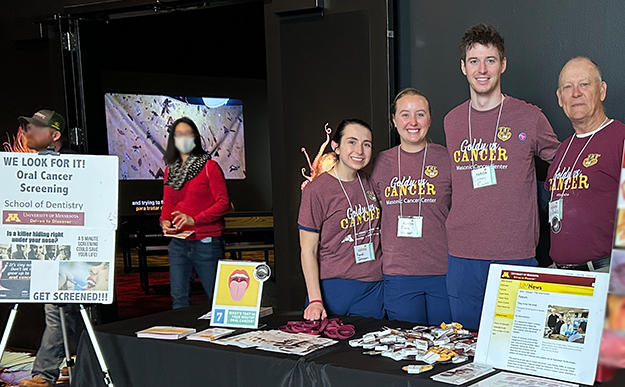Students, faculty join Goldy in the fight against cancer

A School of Dentistry faculty member and three students shared information on oral cancer during Goldy vs. Cancer Day at the Science Museum on Saturday, March 18.
Hosted by the University of Minnesota Masonic Cancer Center, Goldy vs. Cancer Day brought together fifteen groups, including cancer researchers, clinicians and advocates, from the University of Minnesota to spread awareness of various cancers and their prevention and treatment.
Nelson Rhodus, DDS, MPH, professor and director of the Division of Oral Medicine, Oral Diagnosis and Radiology, has participated in the event for more than ten years. This year, he brought three senior DDS students with him.
Over the course of six hours, the four shared information about oral cancer, oral health education and the School of Dentistry. As more than 200 visitors to the Science Museum and to the event passed through the space, Rhodus and the students explained the importance of oral cancer screenings and regular oral hygiene.
“It was an amazing day,” said Rhodus, who was surprised by how busy the booth was. “Sometimes you go into these things thinking about how much work it will be, but the day just flew by. It was a joy.”
As a researcher and a clinician, Rhodus enjoyed sharing the process of oral cancer screenings, and hearing from attendees whose loved ones had survived oral cancer thanks to early detection and awareness. “These folks were appreciative of what we were doing, and the people around them heard testimony of the importance of early screenings,” he said.
As a professor, the best part of Rhodus’s day was witnessing his students advocate and educate. “It was so rewarding for me to see the students educating people, and also witnessing what they learned as they did that,” he said. “It gave these students the opportunity to be at the front lines, and they did a fantastic job.”
The students attending with Rhodus found great value in the day, too. Colton Cannon, DDS/MPH ’23, considers Rhodus a great mentor and an inspiration—leading Cannon to pursue a residency in oral medicine after he graduates. So he was thrilled to have the opportunity to attend Goldy vs Cancer with Rhodus.
“Giving back to the community with the knowledge you’ve learned and skills you’ve developed is essential for being a healthcare professional,” Cannon said. He enjoyed answering questions about oral cancer and providing floss to excite the booth’s youngest visitors. “Oral cancer is so often overlooked, but its importance should not be,” he said. “Regular oral cancer screenings and healthy oral behaviors are essential to early detection and prevention.”
Ciara Houser, DDS ’23, decided to attend the event because she knew that many kids would be involved—and given her plans to attend a pediatric residency and her background working with kids, she knew she could be helpful.
“There isn’t always a lot of awareness specifically about oral cancer, and this event seemed like a great opportunity to offer information to the public, and answer any questions people may have,” she explained. Houser enjoyed providing information on oral health risk factors and introducing children to concepts like oral hygiene and research. She hopes the attendees took away the importance of oral hygiene and early prevention.
“Dentists complete an oral cancer screening at each exam visit, so they’re the first line of defense against oral cancer,” Houser explained. “Getting regular check-ups and cleanings is one of the best things you can do to help catch oral cancer early.”
Randi Johnson, DDS ’23, also hoped to connect with children and spread awareness. “I hope that the kids and their parents were able to see how much we care and how important oral health care is, especially regular visits to the dentists, where oral cancer screenings are completed,” she said. “Typically, dentists are the first line of defense against oral cancer. I hope we were able to not only give away floss, but also spread awareness of just how important oral health is for all ages.”
After a busy day of providing information to the public, Rhodus felt engaged and energized—and hopeful about the progress that had been made. “It was a great experience,” he said. “People looking at regular exhibits throughout the Science Museum had the opportunity to learn about oral cancer and how they can prevent it. And our students had the chance to practice advocacy.”